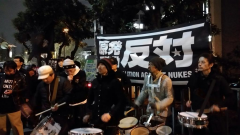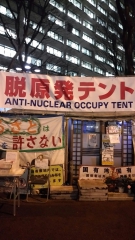22 June 2016
Obama's visit to Hiroshima and Mass shooting in Orlando, Florida
Last month, US president Obama paid visit to Hiroshima and hugged survivor of the atomic bomb which the U.S. force dropped onto the city.
For most Japanese he was very much welcomed because he was the first sitting president who paid visit although he never apologised for the atomic bomb attack.
Many people in the world wondered why Japanese are not so much angry with the U.S. for the atomic bomb attacks.
There are two major reasons. One is we are the one who started the war attacking Pearl Harbour, and the other is we are the aggressor in that period. Before the war between Japan and the U.S., Japan provoked war against China and invaded that nation. In fact, Japan is the first nation that targeted civilians in an enemy state. US modeled after that. Civilian victims in China actually outnumbered that of Japan. So Japan is not a pure victim of the war.
We should have mixed feeling about Hiroshima. Like Germans cannot easily accuse the allied force of atrocities in Dresden that claimed around 20000 lives.
Speaking of mass murder, the mass shooting occurred in Orlando, Florida this month was very shocking. Most of the victims are LGBT Latino people. However, the gunman's motive is still unclear.
Besides that, why is the U.S. still allowing such offenders purchase guns so easily? Even after the shooting US Senate voted down gun control laws. Gun lobbying is very powerful in the U.S.
Seems the U.S. is not the nation that can value human lives. Not just people outside but in their own land.
SO SAD!!
14:50 Posted in Japan News, Politics, Society, US-Japan relationship, USA issues | Permalink | Comments (0) | Tags: war, lgbt, nuclear weapon, history, hiroshima, gun, china, atomic bomb
11 May 2016
French film "Une Nouvelle Amie (The New Girlfriend)" Gender Identity & Sexual Orientation
The story of the film reminds me of American transwoman, Caitlyn Jenner, who was a Olympic gold medalist named Bruce Jenner.
He turned himself to be a woman at the age of 65 but her sexual preference was the same as before. She loves women.
The story started with a funeral scene and a woman named Claire who lost her bestfriend making a speech.
Her late bestfriend, Laura had been married and had a girl. One day Claire entered Laura's house and saw David, husband of Laura, dressed in woman cloth.
Claire was at first upset but later gradually accepting his feminine part and then attracted to him being a woman. In the end, the two fell in love with each other as two women.
Gender Identity and Sexual Orientation are two seperate matters. Never interlook each other.
The movie is about what is a big deal about gender and sexual orientation.
The actor who played David was excellent in terms of casting and his act as transwoman.
He was kind of a bi-sexual or neutral person but never disgusting. He was beautifully musculine as well as feminine.
In Japan it is said Gods or Buddha are asexual. Gender is what we, humanity defines.
Last week I attended one of LBGT events set forth for Tokyo Rainbow Parade 2016 held on 8 of May. The event was discussion on how family members of LGBT deal with their LGBT member and society. I met a Korean American woman whose daughter turned herself into male at the age of 16. She said she was encouraged by Jenner's coming out and was glad that her son could do the same much earlier age.
As the theme in this movie has become common recently, LGBT lifestyle has become more socially acceptable.
We may be living in a greatest transition period.
P.S. The French song, "Une femme avec moi" was just excellent as the movie as a whole.
30 April 2016
5 Years On from Fukushima-Daiichi, 30 Years On from Chernobyl
March and April were the big months for anti-nuclear movement of this year. 5th anniversary of Fukushima Daichi nuke plant's accident and 30th anniversary of Chernobyl nuke accident.
Since 5 years ago, Japanese public opinion has turned out to be mostly anti-nuke generation. Before that, survey results are usually pro-nuke generation.
Since that time, terms such as sievert, becquerel, caesium, iodine, plutonium, strontium, thyroid cancer, china syndrome, and etc have become very familiar. Not just with experts but ordinary citizens.
Fukushima Prefecture still suffer from radioactive released from the crippled plants.
I went there last month. I saw the radioactive-level measurement machine in front of railway station located 45 km away from the plant. Neighboring area of Evacuation zone.
That level is double the normal level before the accident. Radioactive still remains.
It is reported that tens of times of higher percentage of thyroid cancer cases are found among minors in Fukushima. That level is similar to Chernobyl which was estimated to release 10 times more radioactives to the environment.
Currently only two plants out of 50 in Kagoshima Prefecture are being operated. Last month two plants in Fukui Prefecture were shut down due to the court order after citizens filed lawsuit against the power company.
In Tokyo, on 5th anniversary day, citizens gathered at prime minister's residence to show their protest.
In a corner of a ministry building which is in charge of nuclear energy administration, protestants set up occupy tents to show their will since September 2011. It was modeled after Occupy Wall Street movement.
Kan Naoto who was a prime minister at that time interviewed by Asahi Newspaper recently claimed there was a possibility that whole Tokyo area would have become evacuation zone. It was a kind of miracle that it did not go so terrible. It may be attributed to God (or Buddha).
I remember that 5 years ago, I was working and emailing with a client who said the job we were dealing could be worthless because we never knew how our society would have become.
In Chernobyl another centuries are needed to completely dismantled the crippled plant. Thousands years to recover the area to get back to normal zone. As Einstein claimed, humanity and nuclear can never coexist.
Renewable energy has been booming lately. In next decades price of renewable energy will be much lower than nuclear energy.
Nuclear age is coming to end. We must end it!
Not just that, we must change our lifestyle so that we do not need so much energy that we have to rely on such hazardous energy source.
02:19 Posted in Ecology, Japan News, Politics, Science, Society, Tokyo Life | Permalink | Comments (0) | Tags: nuclear power, fukushima
04 April 2016
Film"God is not dead" Cheap Christian propaganda
The story is about debate between a dedicated Christian college student and an atheist college professor.
The professor demanded all the students in his course to write "God is dead" following Nietzche words.
But one student protested. Then he was told to explain why he did to the class.
In the end, Christian prevailed and atheists were portrayed as evil.
First half of the film, I was very attracted to the theme of the film but latter half, I found that I had been deceived.
It seems for Christians, atheists are immoral people. Is Christianity so divine? Maybe for westerners, it is foundation of the society. But not for atheist, polytheist Shinto, Budhist or sometimes Christian Japanese like me.
However, it was great opportunity to learn how conservative Christians think about their own faith.
For them, Christian is superior to any other religion. Once one joins Christian organization, it doesn't matter if s/he has different background and they help each other.
It gives them happier life than others.
But scary thing is being big on it could somtimes lead to oppressing others. Once one believes in Jesus Christ, others would be just evils. Among them, atheists, who don't have faith at all are worst. That means such people are to be persecuted.
But didn't Jesus Christ say "Love your neighbors"? Only within their community?
10:59 Posted in Film, Society | Permalink | Comments (0) | Tags: religion, christianity







